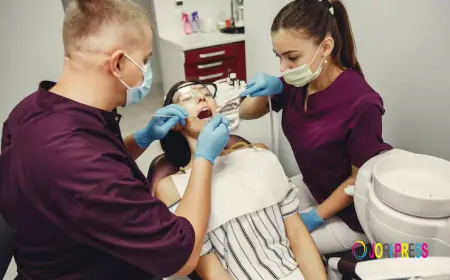ADHD in Adults vs. Children: How a Therapist Tailors Treatment for Every Age
Explore how an ADHD therapist tailors treatment for adults and children. Learn key differences, therapy methods, and tips for managing ADHD at any age.
ADHD (Attention-Deficit/Hyperactivity Disorder) can present differently depending on age. While some symptoms overlap, children and adults often face distinct challenges. This is where a qualified ADHD therapist plays a crucial role—by tailoring treatment to meet the unique needs of each individual. Understanding these differences is essential for developing an effective therapy plan that addresses not just the symptoms but also the underlying struggles.
Understanding ADHD in Children
Children with ADHD often display noticeable hyperactivity, impulsivity, and difficulty staying focused. These behaviors may show up in the classroom, at home, or during social activities. Parents, teachers, and caregivers often spot these signs early, which leads to diagnosis in childhood.
An ADHD therapist working with children focuses on:
-
Behavioral strategies: Helping the child learn self-control and emotional regulation.
-
School support: Collaborating with teachers to create an accommodating learning environment.
-
Parental guidance: Coaching parents on consistent routines and discipline strategies.
-
Social skills training: Teaching the child how to interact positively with peers.
For kids, therapy often incorporates play-based techniques, positive reinforcement, and structured activities that make learning self-regulation skills engaging.
Understanding ADHD in Adults
Adult ADHD is often underdiagnosed because symptoms can be mistaken for stress, anxiety, or lack of organization. While hyperactivity may lessen with age, adults often struggle with:
-
Time management
-
Procrastination
-
Disorganization
-
Relationship challenges
-
Impulsive decision-making
An ADHD therapist working with adults tailors therapy toward:
-
Executive functioning skills: Helping clients plan, prioritize, and meet deadlines.
-
Workplace strategies: Navigating distractions and improving productivity.
-
Relationship counseling: Addressing communication breakdowns caused by ADHD behaviors.
-
Stress management: Reducing anxiety linked to ADHD-related challenges.
Therapists for adults typically use cognitive-behavioral therapy (CBT), coaching methods, and lifestyle adjustments to improve daily functioning.
Key Differences in Treatment Approaches
While both children and adults benefit from individualized care, the methods and goals vary:
-
Therapy Style: Play therapy and behavior charts for children vs. goal-oriented CBT for adults.
-
Focus Areas: School performance for children vs. work-life balance for adults.
-
Parental Involvement: Essential for children, optional for adults.
-
Skill Development: Social skills in kids vs. executive functioning in adults.
An experienced ADHD therapist understands these nuances and adapts strategies accordingly, ensuring therapy is age-appropriate and effective.
The Role of Family in ADHD Therapy
Family plays an important role regardless of age. For children, parents help implement routines and reinforce strategies at home. For adults, family members may be involved in couples therapy or as accountability partners.
Why a Tailored Approach Works Best
ADHD isn’t one-size-fits-all, so therapy shouldn’t be either. The best outcomes happen when treatment considers the person’s age, lifestyle, environment, and personal goals. A skilled ADHD therapist will:
-
Conduct thorough assessments
-
Set realistic, measurable goals
-
Use evidence-based techniques
-
Adjust strategies as progress is made
By tailoring treatment, therapists empower clients of all ages to take control of their ADHD symptoms and improve their quality of life.
Final Thoughts
Whether working with a child struggling in school or an adult trying to juggle work, family, and personal responsibilities, an ADHD therapist plays a key role in guiding clients toward better focus, organization, and emotional well-being. Recognizing that ADHD looks different at each stage of life allows therapy to be more effective, personalized, and sustainable.
FAQs
Q1: Can a child outgrow ADHD?
Some children may see symptom improvement as they age, but many continue to experience ADHD into adulthood. Early therapy can help build coping skills that last a lifetime.
Q2: Is medication always necessary for ADHD treatment?
Not always. While medication can be effective for some, behavioral therapy and lifestyle changes can also help manage symptoms.
Q3: How does therapy for adult ADHD differ from child ADHD?
Adult therapy often focuses on managing responsibilities, improving relationships, and building executive functioning skills, while child therapy emphasizes behavior management and academic support.
Q4: Can ADHD develop in adulthood?
ADHD is typically present from childhood, but some adults are diagnosed later because symptoms were overlooked or masked when they were younger.
Q5: How long does ADHD therapy take?
Therapy duration varies based on the individual’s needs, goals, and progress. Some see improvements in months, while others benefit from ongoing support.
What's Your Reaction?
 Like
0
Like
0
 Dislike
0
Dislike
0
 Love
0
Love
0
 Funny
0
Funny
0
 Angry
0
Angry
0
 Sad
0
Sad
0
 Wow
0
Wow
0
















































